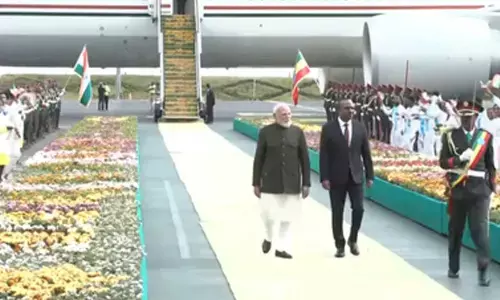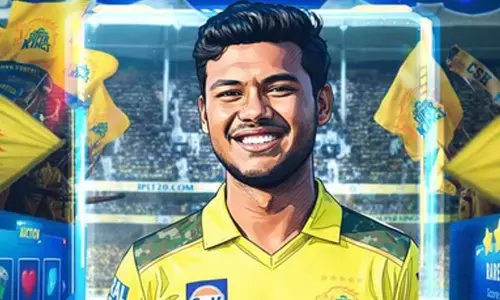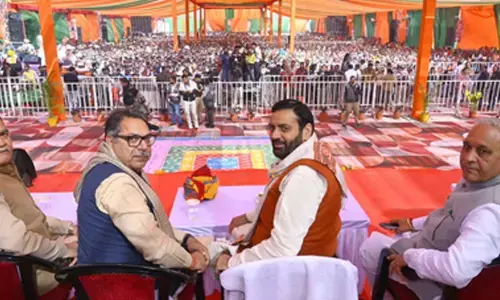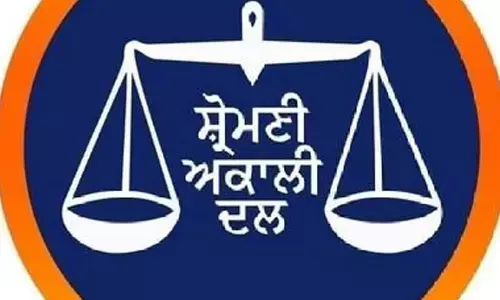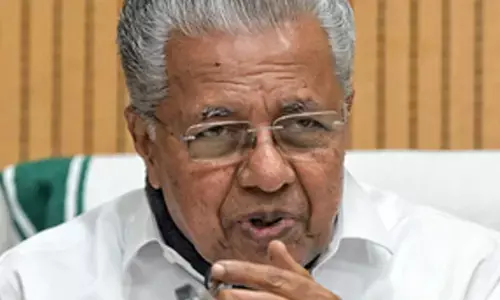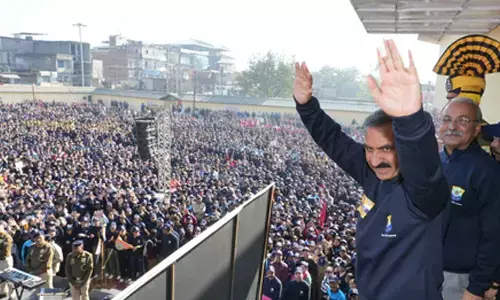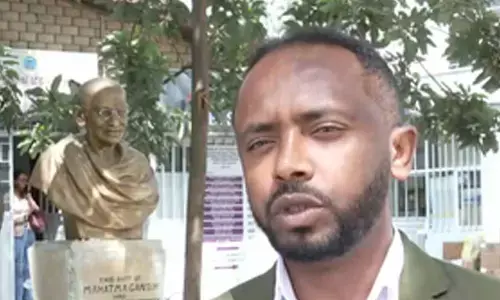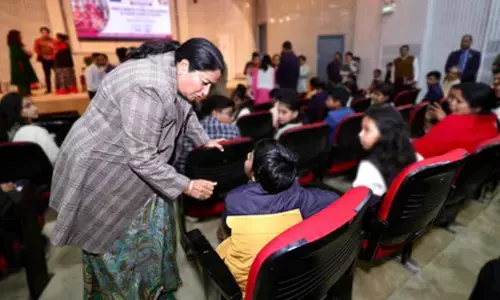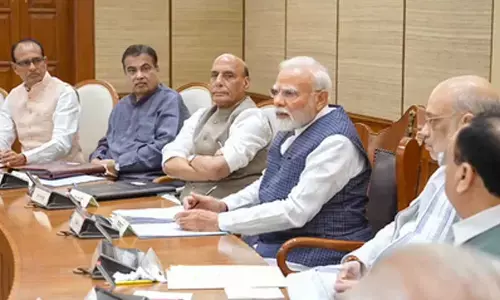In Modi's Gujarat, religious prejudice still exists

In Modi\'s Gujarat, Religious Prejudice Still Exists. Ali Husain is a prosperous young Muslim businessman. He recently bought a Mercedes and lives in a suburban-style gated community that itself sits inside a ghetto.
.jpg) Ahmedabad: Ali Husain is a prosperous young Muslim businessman. He recently bought a Mercedes and lives in a suburban-style gated community that itself sits inside a ghetto.
Ahmedabad: Ali Husain is a prosperous young Muslim businessman. He recently bought a Mercedes and lives in a suburban-style gated community that itself sits inside a ghetto.
In Gujarat, it is so difficult for Muslims to buy property in areas dominated by Hindus even the community's fast-growing urban middle class is confined to cramped and decrepit corners of cities.
Husain embodies the paradox of Gujarat: the state's pro-business leadership has created opportunities for entrepreneurs of all creeds; yet religious prejudice and segregation are deeply, and even legally, engrained.
If a Muslim enquires about a property in a new development, often the response is: "Why are you even asking?" said Husain, speaking at his home in the Muslim neighbourhood of Juhapura.
Separation of communities is common across India. Nowhere is it as systematised as it has become in Gujarat.
That matters because chief minister, Narendra Modi, could soon run the country. Exit polls show that when results of a general election are announced on May 16, Modi's Bharatiya Janata Party (BJP) and its allies will win a majority in parliament, almost certainly making him the next prime minister.
The 63-year-old has ruled Gujarat since 2001. He has surrounded himself with technocrats - and also ministers and advisers who promote "Hindutva". As prime minister, Modi would lead not just 975 million Hindus but 175 million Muslims, around 15 percent of India's population and the third-largest Muslim population in the world.
Modi's record in his state is clouded by riots in 2002, when 1,000 people, mostly Muslims, died in a frenzy of mob violence. Modi still struggles to shake off the perception he did not do enough to stop the bloodshed, despite a Supreme Court investigation that found no case against him and his own insistence he did all he could to keep the peace.
Even some Hindus connect Modi to the riots. Pradeep Shukla, a prominent businessman and former member of the BJP in Bhavnagar said Hindus "believe that, somewhere, indirectly, Modi had a hand in it because he supports Hindus. This is why they vote for him."
On the campaign trail, Modi has tried to project a moderate image with a platform that downplays hot-button Hindu issues and emphasises growth and "development for all".
But in Gujarat's neighbourhoods and cities, people tell a different story.
HISTORY SCARRED BY VIOLENCE
Husain is one of roughly 400,000 people living in Juhapura, a teeming Muslim township within Ahmedabad. Many of them moved there after the 2002 riots. Local Hindus jokingly refer to it as "Little Pakistan".
Memories of the 2002 rioting have not faded for the many residents of Juhapura who lost relatives, homes and businesses. And its legacy has been increasing segregation.
In particular, a property law unique to Gujarat has perpetuated segregation, creating ghettos such as Juhapura and a sense of apartheid in some urban areas.
The "Disturbed Areas Act", a law that restricts Muslims and Hindus from selling property to each other in "sensitive" areas, was introduced in 1991 to avert an exodus or distress sales in neighbourhoods hit by inter-religious unrest.
Modi's government amended the law in 2009 to give local officials greater power to decide on property sales. It also extended the reach of the law, most recently in 2013 - 11 years after the last major religious riots.
The state government says the law is meant to protect Muslims, who account for just under 10 percent of the state's 60 million people. "It prevents ethnic cleansing and people being forced out," a senior government official who requested anonymity told Reuters.
Critics say the act's continued enforcement and the addition of new districts covered by it - about 40 percent of Ahmedabad is now governed by the law - means it is effectively being applied as a tool of social engineering.
The Gujarat High Court in a 2012 case questioned the state government’s use of the act to block the sale of properties by Hindus to Muslims.
The Indian Express newspaper said in a recent editorial: "More Muslims and Hindus have moved into separate spaces in Gujarat, finding trust and assurance only among neighbours of their own community, and it has ended up entrenching segregation and shutting Muslims out of the mainstream."
"SPIT ON HIM"
Among those pressing hardest for the law to be maintained and extended to other parts of Gujarat are Hindu nationalists, such as Pravin Togadia.
One evening in April, Togadia sat before a crowd of neighbours in Bhavnagar, an otherwise bustling town three hours drive from Ahmedabad. To bursts of applause, he railed against a Muslim scrap dealer, Ali Asghar Zaveri, who had dared to purchase a property there.
His forehead smeared with vermilion, a mark of piety, Togadia told his audience they should break open their new neighbour's padlocked gates and take over the two houses behind them before Zaveri could get a chance to move in.
"When he comes out onto the street, you should spit on him," he told the gathering. "Get 10-15 children to stand around and ... throw tomatoes at him."
Togadia added that if Zaveri did not give up the property, which he reportedly bought for $250,000, they should go in their thousands to his scrap shop and surround it.
"Take stones with you, burn tyres," he said, according to a video of the meeting, which concluded with women in the crowd of around 100 people chanting a Hindu hymn.
The video was posted on YouTube. Local police, who acquired a copy, have filed a case of "hate speech" against Togadia.
Togadia is president of the Vishva Hindu Parishad. According to local media reports, he said news articles about the incident were "fabricated and written with malicious intention to malign" both him and his organisation.
Modi did not comment directly on the VHP leader's outburst. But in a tweet widely interpreted as condemnation, he said he disapproved of "petty statements by those claiming to be the BJP's well-wishers".
ESCALATING PROPERTY PRICES
Bhavnagar is not covered by the Disturbed Areas Act. But in one district of the town, Hindus have effectively imposed it, raising a banner at the entry to a narrow lane that reads: "In this area, locality or by-lane no property or building can be sold or rented to people who are not of this religion."
Reuters interviewed two local VHP leaders who said they have made repeated requests since 2004 for Bhavnagar to be put under the Disturbed Areas Act.
One of the two, S.D. Jani, said Hindus object to Muslims living among them because they are not vegetarian and many have committed acts of terrorism abroad. His colleague, Kirit Mistry, complained that Muslims slaughter cows, which are sacred to Hindus, and that the Muslim population is growing faster than Hindus because they have more children.
Several Hindus who declined to be named for this story said if Muslims buy property in their areas, the value of their own homes falls. One said the stigma of living alongside Muslims can make it difficult for Hindus to marry off their daughters.
One consequence of the segregation: land and home prices in Juhapura and other Muslim areas have escalated more than in Hindu areas as the community finds its ability to expand and build more properties limited.
“Prices have increased so much because the expansion of Juhapura has been contained, not only by walls but also by the building of Hindu colonies ...at the periphery of the locality,” Christophe Jaffrelot, a scholar with the Carnegie Endowment for International Peace, wrote in a recent column in the Indian Express.
MUSLIMS FOR MODI
At the same time, some Muslims in Gujarat have been lifted on a tide of rising prosperity. The state has long been a model of economic success in India given its coastal location, large ports and industrialisation.
According to National Survey Sample Office figures, for instance, Gujarat is one of the top states for Muslim employment. The national unemployment rate among Muslims was almost double that of Gujarati Muslims in 2009-10.
But the picture is far from clear. Data from the same source showed nearly one in three Gujarati Hindus had a secondary education or higher in 2009-10, against one in five for Muslims - roughly in line with the average for Muslims across the country.
Zafar Sareshwala is among those who have prospered. One of Gujarat's wealthiest Muslims, he owns a chain of BMW showrooms. Sareshwala supports Modi even though his family was financially ruined by the 2002 unrest. His view changed overnight the following year, he said, after a meeting with Modi.
"He was deeply anguished. He was apologetic about the scale of the damage," Sareshwala recalled. "Modi promised justice would be delivered and said he would never discriminate against Muslims."
Sareshwala estimated that 30 percent of Gujarat's Muslims now back the BJP thanks to urban development and access to services that Modi has brought. Opinion polls have not projected the Muslim vote in Gujarat.
"People call him a dictator, I call him decisive," he said.
Even much poorer Muslims back Modi. In a dirt-poor Ahmedabad riverside slum of about 150 families, most of them Muslim, five of eight women who spoke with Reuters said they had voted for the BJP, even though Modi's government bulldozed their rickety homes two years ago, forcing them to rebuild away from the waterfront.
"Modi has done some good work. Our children can get scholarships and school meals. Women feel protected, and widows get compensation," said 48-year-old Shabnam Banu, sitting on the floor with her friends in a simple room where a slow-moving ceiling fan did little to alleviate the pre-monsoon heat.
Still, Banu herself couldn't bring herself to vote for Modi, selecting the "none of the above" option on election day.
"Our main fear is he will throw us out of the country," she said. "What if some of his people come and attack us?"
PEOPLE ARE AFRAID
In Juhapura, businessman Ali Husain has made it his mission to break down barriers between the state's communities. Two years ago he persuaded a major developer to sell homes to Muslims in luxury townships on the edge of Ahmedabad, and he is now working with a Hindu company to produce Halal food.
Other initiatives have flopped. In February, Husain organised a Hindu-Muslim business conclave, sponsored by the state government and addressed by Modi. Few Muslims turned up. "Truly speaking, the Muslims, they are not with Modi," he said.
Husain has bought a house in a Hindu area of Ahmedabad, and wants to move out of Juhapura. But his parents are too scared to leave. He is too nervous to even take the sheet off his Mercedes because neighbours might think, after his recent meeting with Modi, he has sold out for money.
"I encourage Muslims to come out of Muslim areas and live everywhere, to end ghettoization," Husain said. "But ... people are afraid that if they come out the violence could happen again."


